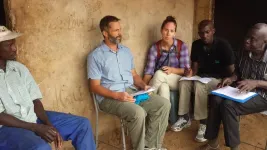(Press-News.org) Several indicative factors, including junior rank, male sex, and younger age, are strongly linked to ‘harmful gambling’ among serving UK military personnel, finds an analysis of survey responses, published online in the journal BMJ Military Health.
Harmful gambling refers to the toll taken on finances, health, personal relationships, and work: nearly 1 in 4 respondents reported one or other of these effects over the past year.
The findings prompt the researchers to call for the prioritisation of better, earlier, and targeted support to stave off the harmful consequences of gambling among the military.
A growing body of international evidence indicates that Armed Forces personnel may be at greater risk of experiencing harm from gambling than the general population, point out the researchers.
Gambling is usually classified as either strategic, which involves prior knowledge or skill to influence or predict outcomes—sports betting and card games, such as poker—for example, or non-strategic, which relies on luck—fruit/slot machines and casino games like roulette.
Strategic gamblers may be more at risk of gambling harms than their non-strategic peers, explain the researchers.
To find out if there are certain characteristic factors that might help to identify a soldier at risk of gambling harms, the researchers surveyed active Armed Forces personnel from all branches and services, excluding the Royal Fleet Auxiliary (a uniformed civilian branch of the Royal Navy) in the Spring of 2023.
After excluding those who didn’t complete the survey, the final analysis is based on the responses of 608 active service military personnel.
The information sought included branch of service; full-time regular or a part-time reservist status; year of enlistment; current rank; and deployment in the past 3 years, including where, and for how long.
Validated measures were used to assess depression, anxiety, PTSD, alcohol consumption, and suicidal thoughts over the past year. Respondents were then asked to describe their gambling activities, if any, and the consequences.
Harmful gambling risk (low to problem) was measured using a validated scale widely used around the globe for military personnel (PGSI), while the Combined Gambling Harms (CGH) measure was used to evaluate the type and number of harms.
The average age of the respondents was 39, and most were male (85.5%), and of White British (87%) ethnicity. Most had been educated to A-level or above (80%); 30% had a postgraduate qualification. Most were in a relationship (84%) and slightly over half lived with dependent children (54%).
Current mental health issues weren’t common: depression (54; 9%), anxiety (61;10%), or PTSD (28; 4.5%). Suicidal thoughts or attempts in the past year were reported by 105 (just over 17%).
Nearly half the respondents were classed as heavy drinkers who exceeded recommended units at any one time daily, weekly, or monthly (279; 46%).
In all, nearly 3 out of 4 (72%; 438) said they had gambled over the past year, and 272 (45%) reported doing so within the past week. Some 74 (12%) said they had never gambled.
The most popular activities were the National Lottery (349; 57.5%), service-related lotteries (314; 52%), and online sports betting (218; 36%). Most gamblers preferred non-strategic (302; 69%) over strategic gambling (55;13%). The rest (81;18.5%) expressed no preference.
The PGSI score indicated that 64 (12%) were at low risk of harmful gambling, 22 (just over 3.5%) were at moderate risk, and 37 (6%) were at risk of problem gambling.
In all, nearly 1 in 4 (23%; 123) respondents who had gambled over the past year had experienced a gambling harm, with the average number of harms totalling 2.
Over a third 36% (44) of them had experienced at least one financial harm; over a quarter said that the quality of their relationships had been affected (32; 26%), and 1 in 5 (25) said that gambling had had a detrimental impact on their ability to work.
Certain demographic factors were predictive of harmful gambling. These included male sex (tripling in risk), age 20–29 (more than double the risk), and living alone in service accommodation (69% heightened risk).
Significant military risk factors included junior non-commissioned officer/other rank (more than 4 times the risk), military service lasting fewer than 10 years (more than twice the risk), and deployment twice or more in the past 3 years (86% heightened risk).
Mental health issues predictive of harmful gambling included likely depression and/or anxiety (more than 3 times the risk), risky drinking (69% heightened risk), loneliness and suicidal thoughts/attempts over the past year (twice the risk).
Strategic gamblers were 5 times as likely to be at risk of gambling harm as non-strategic gamblers.
This is an observational study, and as such, no definitive conclusions can be drawn about cause and effect. And the researchers acknowledge various limitations to their findings, including that the respondents were older than the average age (31) of Armed Forces personnel.
But they nevertheless conclude: “These findings highlight the importance of screening for gambling engagement, gambling type, mental health and alcohol use in both currently serving personnel and new recruits to the [Armed Forces].”
END
Junior rank, male sex, younger age strongly linked to ‘harmful gambling’ among UK military
Nearly 1 in 4 say gambling has affected their personal/professional lives over past year. Better, earlier, and targeted support needed, urge researchers
2024-06-28
ELSE PRESS RELEASES FROM THIS DATE:
Poorer teen mental ability linked to as much as tripling in stroke risk before age of 50
2024-06-28
A lower level of mental ability during the teenage years may be linked to as much as a tripling in the risk of having a stroke before the age of 50, finds research published online in the Journal of Epidemiology & Community Health.
The observed associations held true even after factoring in current diabetes and limiting the age of a first stroke up to 40, prompting the researchers to suggest that more comprehensive assessments beyond traditional stroke risk factors are now needed to stave off disability and death.
Recent evidence suggests that cases of stroke ...
Adults conceived by donors left behind by fertility industry
2024-06-28
Children conceived by using egg or sperm donors have the same well-being outcomes as non-donor conceived people.
However, they are more likely to have identity difficulties and issues with trust. Secrecy and anonymity about their genetic parentage can have a profound impact on well-being say authors. They warn that children and adults conceived using donor gametes have not been centred in the assisted reproductive industry and more information is needed about adult wellbeing.
The study is published today in the British Journal of Obstetrics and Gynaecology by researchers King’s College London. The study is the first systematic ...
Novel method optimizes extraction of antioxidant and colorant from jabuticaba peel
2024-06-28
Scientists at the State University of Campinas (UNICAMP) in Brazil and the University of Cadiz (UCA) in Spain have successfully deployed a novel method of extracting high-value-added chemical compounds from the peel of jabuticaba (Plinia cauliflora). The method, which simplifies the process and enhances its efficiency, is described in an article published in Journal of Food Composition and Analysis.
The aim was to optimize extraction of anthocyanin, a potent antioxidant found in strawberries, blackberries and raspberries as well as jabuticabas, among other sources. It has anti-inflammatory effects and is also a natural ...
Researchers discover how nerve cells in bat brains respond to their environment and social interactions with other bats
2024-06-28
Vienna, Austria: Researchers have found that nerve cells in the hippocampus region of the brain encode complex information on numerous characteristics of other individuals in the same social group.
The work, which is being carried out in bats, is the first to show this in a large, mixed-sex group of wild, social animals, and is important because it sheds light on how the brain operates and generates thinking processes and behaviour.
Professor Nachum Ulanovsky, Head of the Center for Learning, Memory and Cognition at the Weizmann Institute of Science, ...
Simulating blood flow dynamics for improved nanoparticle drug delivery
2024-06-27
Despite gaining a bad rap in mainstream media in recent years, nanoparticles have been successfully used for decades in targeted drug delivery systems. Drug molecules can be encapsulated within biodegradable nanoparticles to be delivered to specific cells or diseased tissues. However, blood flow dynamics can significantly affect the nanoparticle’s ability to bind at the target site and stay adhered long enough for the drug to be released.
Drawing inspiration from civil, mechanical, electrical and chemical engineering, University of Illinois Urbana-Champaign professors Arif Masud and Hyunjoon Kong have developed and tested a new mathematical model to accurately simulate ...
Research and efforts to combat schistosomiasis earn geographer David López-Carr several high-profile awards
2024-06-27
(Santa Barbara, Calif.) — What if you could take an ecologically degraded environment that presents a public health problem, and devise a powerful and elegant solution that not only restores its functionality but also reduces its health impacts while addressing food and water access and alleviating poverty? An international team of biologists, social scientists and medical researchers in the U.S. and Senegal did just that, and for their innovation and research, published in the journal Nature, has received several prestigious awards.
“It feels gratifying to be recognized for work finding win-win solutions for the environment and people,” said UC Santa ...
US states shape foreign policy amid national China unease, research shows
2024-06-27
State-level officials such as governors, state legislators and attorneys general are shaping U.S.-China relations as the two countries navigate a strained geopolitical relationship, according to new research by political scientist Kyle Jaros.
“The state level has independent importance in the U.S.-China relationship — it’s not just a reflection of what’s happening at the national level,” said Jaros, associate professor of global affairs in the Keough School of Global Affairs at the University of Notre Dame. “The actions taken by state and local officials — and their Chinese counterparts — not only affect their own communities, ...
Midwest Center for AIDS Research to help end regional HIV epidemic
2024-06-27
Since the peak of the AIDS epidemic, the U.S. has achieved significant advancements in preventing and treating HIV, though progress has been uneven across regions and slower than necessary. In Missouri, where the number of new HIV diagnoses and deaths has not improved since 2017, there is a need to recapture momentum in addressing the disease.
In a bid to jump-start the stalled campaign against HIV in the region, researchers at Washington University School of Medicine in St. Louis and Saint Louis University plan to establish the Midwest Developmental Center for AIDS Research with funding from the National ...
WIC enrollment reduces poor pregnancy outcomes for parents and babies, study finds
2024-06-27
More than one in 10 households in the United States last year did not have access to adequate and nutritious food, according to the U.S. government. Further, food and nutrition insecurity lead to a higher risk of poor pregnancy outcomes.
The U.S. Special Supplemental Nutrition Program for Women, Infants and Children (WIC) is one of the main federal food assistance programs that aims to reduce food insecurity for eligible pregnant, postpartum and breastfeeding people and their children. WIC helps improve the health of participants and their families by providing access to food, nutrition education, and referrals ...
Northwestern researchers propose a new, holistic way to teach synthetic biology
2024-06-27
The field of synthetic biology, the science of manipulating biology, has a lot of “cooks in the kitchen,” which has both helped it flourish and made it unusually difficult to create a cohesive, consistent curriculum for students at every level of study. Each discipline involved — from chemical engineering to ethics — has a unique approach to teaching and literature, which creates inconsistencies between what scientists learn.
Now, Northwestern University researchers propose a new way to teach synthetic biology that uses different levels of organization — starting at the molecular scale and growing ...
LAST 30 PRESS RELEASES:
Prevalence of over-the-counter and prescription medication use in the US
US child mental health care need, unmet needs, and difficulty accessing services
Incidental rotator cuff abnormalities on magnetic resonance imaging
Sensing local fibers in pancreatic tumors, cancer cells ‘choose’ to either grow or tolerate treatment
Barriers to mental health care leave many children behind, new data cautions
Cancer and inflammation: immunologic interplay, translational advances, and clinical strategies
Bioactive polyphenolic compounds and in vitro anti-degenerative property-based pharmacological propensities of some promising germplasms of Amaranthus hypochondriacus L.
AI-powered companionship: PolyU interfaculty scholar harnesses music and empathetic speech in robots to combat loneliness
Antarctica sits above Earth’s strongest “gravity hole.” Now we know how it got that way
Haircare products made with botanicals protects strands, adds shine
Enhanced pulmonary nodule detection and classification using artificial intelligence on LIDC-IDRI data
Using NBA, study finds that pay differences among top performers can erode cooperation
Korea University, Stanford University, and IESGA launch Water Sustainability Index to combat ESG greenwashing
Molecular glue discovery: large scale instead of lucky strike
Insulin resistance predictor highlights cancer connection
Explaining next-generation solar cells
Slippery ions create a smoother path to blue energy
Magnetic resonance imaging opens the door to better treatments for underdiagnosed atypical Parkinsonisms
National poll finds gaps in community preparedness for teen cardiac emergencies
One strategy to block both drug-resistant bacteria and influenza: new broad-spectrum infection prevention approach validated
Survey: 3 in 4 skip physical therapy homework, stunting progress
College students who spend hours on social media are more likely to be lonely – national US study
Evidence behind intermittent fasting for weight loss fails to match hype
How AI tools like DeepSeek are transforming emotional and mental health care of Chinese youth
Study finds link between sugary drinks and anxiety in young people
Scientists show how to predict world’s deadly scorpion hotspots
ASU researchers to lead AAAS panel on water insecurity in the United States
ASU professor Anne Stone to present at AAAS Conference in Phoenix on ancient origins of modern disease
Proposals for exploring viruses and skin as the next experimental quantum frontiers share US$30,000 science award
ASU researchers showcase scalable tech solutions for older adults living alone with cognitive decline at AAAS 2026
[Press-News.org] Junior rank, male sex, younger age strongly linked to ‘harmful gambling’ among UK militaryNearly 1 in 4 say gambling has affected their personal/professional lives over past year. Better, earlier, and targeted support needed, urge researchers




